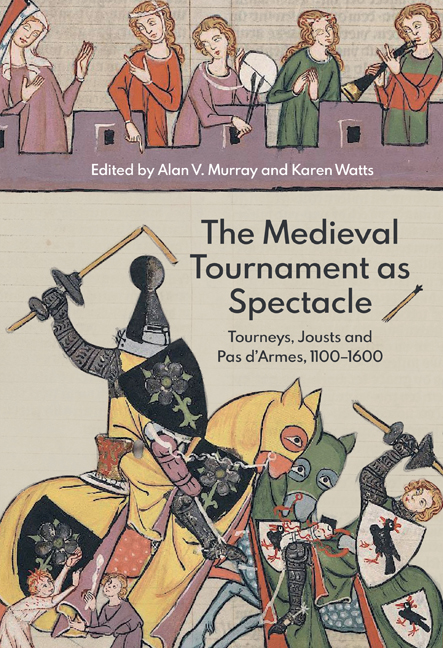Book contents
- Frontmatter
- Contents
- List of Illustrations
- List of Contributors
- Preface and Acknowledgements
- Introduction: From Mass Combat to Field of Cloth of Gold
- Research on the Medieval Tournament (1100–1600): A Select Bibliography
- 1 Now Form Up Close Together! Tactics and Ethos of the Tourney in Early German Sources (Twelfth to Thirteenth Centuries)
- 2 Por pris et por enor: Ideas of Honour as Reflected in the Medieval Tournament
- 3 Richard II of England and the Smithfield Tournament of October 1390: An Instrument to Establish Royal Authority
- 4 Alle myn harneys for the justes: Documents as a Source for Medieval Jousting Armour
- 5 The Tournament Saddle
- 6 Between Sport and Theatre: How Spectacular was the Pas d’armes?
- 7 Art Imitating Life Imitating Art? Representations of the Pas d’armes in Burgundian Prose Romance: The Case of Jehan d’Avennes
- 8 The Foot Combat as Tournament Event: Equipment, Space and Forms
- 9 Power and Pageantry: The Tournament at the Court of Maximilian I
- 10 The Field of Cloth of Gold: Arms, Armour and the Sporting Prowess of King Henry VIII and King Francis I
- Appendix 1 Calendar of the Royal Combats at the Field of Cloth of Gold, June 1520
- Appendix 2 Articles for the Challenge: The Emprise
- Index of Objects
- Index of Manuscripts
- General Index
9 - Power and Pageantry: The Tournament at the Court of Maximilian I
Published online by Cambridge University Press: 11 September 2020
- Frontmatter
- Contents
- List of Illustrations
- List of Contributors
- Preface and Acknowledgements
- Introduction: From Mass Combat to Field of Cloth of Gold
- Research on the Medieval Tournament (1100–1600): A Select Bibliography
- 1 Now Form Up Close Together! Tactics and Ethos of the Tourney in Early German Sources (Twelfth to Thirteenth Centuries)
- 2 Por pris et por enor: Ideas of Honour as Reflected in the Medieval Tournament
- 3 Richard II of England and the Smithfield Tournament of October 1390: An Instrument to Establish Royal Authority
- 4 Alle myn harneys for the justes: Documents as a Source for Medieval Jousting Armour
- 5 The Tournament Saddle
- 6 Between Sport and Theatre: How Spectacular was the Pas d’armes?
- 7 Art Imitating Life Imitating Art? Representations of the Pas d’armes in Burgundian Prose Romance: The Case of Jehan d’Avennes
- 8 The Foot Combat as Tournament Event: Equipment, Space and Forms
- 9 Power and Pageantry: The Tournament at the Court of Maximilian I
- 10 The Field of Cloth of Gold: Arms, Armour and the Sporting Prowess of King Henry VIII and King Francis I
- Appendix 1 Calendar of the Royal Combats at the Field of Cloth of Gold, June 1520
- Appendix 2 Articles for the Challenge: The Emprise
- Index of Objects
- Index of Manuscripts
- General Index
Summary
We should then talk of another pursuit at which many men-at-arms aim to make their reputation: that is at deeds of arms at tournaments. And indeed, they earn men praise and esteem for they require a great deal of wealth, equipment and expenditure, physical hardship, crushing and wounding, and sometimes danger of death. For this kind of practice of arms, there are some whose physical strength, skill, and agility enable them to perform so well that they achieve in this activity such great renown for their fine exploits; and because they often engage in it, their renown and their fame increases in their own territory and that of their neighbours; thus they want to continue this kind of pursuit of arms because of the success God has granted them in it. They content themselves with this particular practice of arms because of the acclaim they have already won and still expect to win from it. Indeed they are worthy of praise; nevertheless he who does more is of greater worth.
The medieval tournament and the mental images it inspires are central to the modern conception of the Middle Ages. It is a cultural touchstone, familiar to both its original audiences and its contemporary mythologisers, and it encapsulates the often contradictory combination of lofty chivalric ideals and martial violence that helped to define the era. One figure who bridged the gap between the medieval and modern ideal of the tournament was Maximilian I, king of the Romans and Holy Roman Emperor (1459– 1519). Maximilian's reputation, in his own lifetime and beyond, was in large part built around the tournament.
In the above passage, the French knight and noted author on chivalry Geoffroi de Charny (c. 1300–56) articulated both the risk and the appeal of the tournament. Competitors had the chance to win fame and renown, as well as financial rewards, while also immersing themselves in the chivalric ethos of the time. The tournament space was an environment in which men could act out the motions of warfare without (usually) the consequences of it. Maximilian found himself at a crossroads of the tournament, and those combats in which he was involved demonstrate this. In many ways, his tournaments embody the most lavish forms of spectacle that could be found in such late medieval events.
- Type
- Chapter
- Information
- The Medieval Tournament as SpectacleTourneys, Jousts and Pas d'Armes, 1100-1600, pp. 185 - 207Publisher: Boydell & BrewerPrint publication year: 2020



